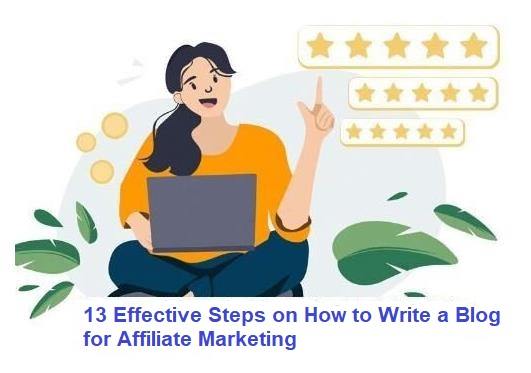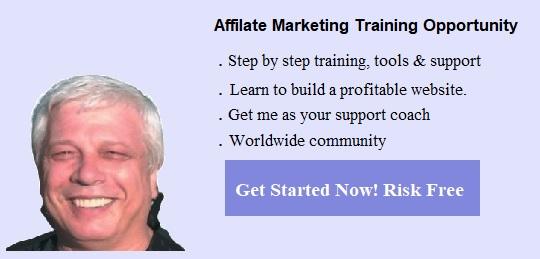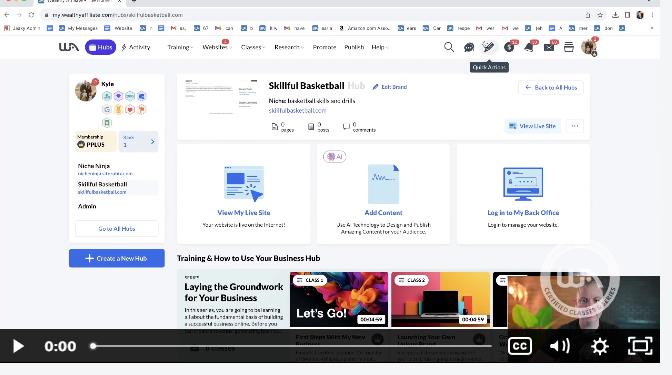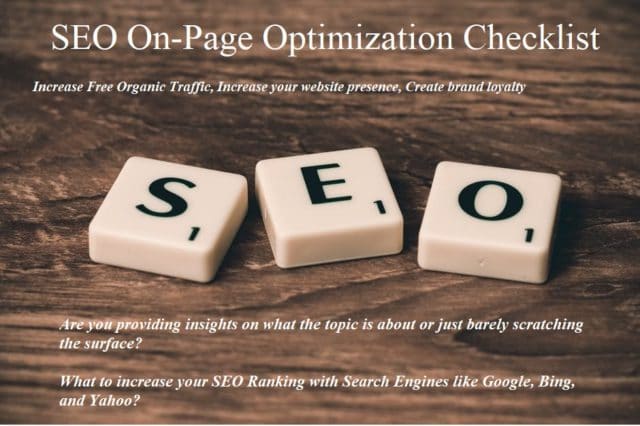
Want to improve your presence, gain readers’ trust, build authority, and rank higher online? Then learn how to write a blog for affiliate marketing in 13 steps.
Key Takeaways:
- It’s all about your niche.
- Best SEO Practices.
- Keywords and Research.
- Answer the question your audience is seeking.
- Helping Not Selling.
- Using, understanding, and applying Google’s Guidelines.
- Don’t be a robot, be a human.
- Stop chasing money and focus on helping first.
- Getting found within the search engines.
- Create Informational Content First.
- Don’t join Affiliate Programs straight away.
- Using the KISS Formula.
- Staying honest and transparent.
4 Key Takeaways
- Selecting your niche based on passion
When you choose a niche based on your passion or interests, it makes it more enjoyable to write content. Doing so will bring a stronger connection with your target audience.
- Effective Keyword Research and SEO
Using various tools like Jaaxy and Google’s People Also Ask to find your audience.
Applying the best SEO practices will help boost your ranking. This will help you attract the right audience that resonates with your niche.
- Clear and concise titles
Create engaging and attention-grabbing titles that shows transparency.
Do not use clickbait titles that do not relate to the content. People see through this and will leave your site immediately and look elsewhere. This will affect your ranking as well.
- Creating Engaging content.
When creating content, it should match what your title is about.It needs to show transparency and answer the questions or issues your audience is looking for.
Note:
As an affiliate for Wealthy Affiliate, should you click a link and join, I may get a commission for any referrals; at no added cost to you.
For a full affiliate disclosure, you can read it here.
13 Effective Steps on How to Write a Blog for Affiliate Marketing
You do not need to be an expert in writing when first starting.
As you continue to write more content and evolve, it will become easier along the way.
Doing proper research based on your niche allows you to become more productive.
This also helps you become more enthusiastic to continue to write more.
Creating a blog on your website is all about delivering content. One that is valuable to your readers and provides them with the answers to what they are seeking.
For people to find you on the search engines ranking on the first page is the place to be.
These 13 effective steps will show you how to rank high within the search engines. You will also learn how to build trust and authority with your readers and search engines.
This is the way forward when creating a blog for affiliate marketing in 2024.
Step 1) It’s all about your niche:
Writing anything and everything on your website won’t get you there compared to the old days 10 or 15 years ago.
Times have changed, and people want answers to what they are seeking. This is why your niche should be on something specific and not everything under the Sun.
You are seeking a specific target audience based on your niche.
You will be writing content that will help your specific audience find what they are looking for.
It could be finding a solution they need or giving them answers or options to think about
Ask yourself:
What are my passions or interests?
A great way to work this out is to make a list of all your passions, interests, or hobbies. One that you can write about on an ongoing basis.
Writing about your passions or interests helps you become more creative.
This makes it much more enjoyable to write.
You become more focused as you share your interests with the same group of people as you.
You will build trust with your audience that will come back and revisit your site to learn more.
The more returning visitors you have the greater the following. As a result, the greater opportunity you have to promote products or services based on your niche.
Avoiding niches you have no passion for:
Working on a niche you have no passion for will create further struggles later in writing blogs.
This most often leads to quitting affiliate marketing.
Also, don’t look for untapped niches there are none.
Avoid seeking the most profitable niche:
Know that any niche can be profitable when applying the correct steps discussed.
Always go for the niche you have a passion for which makes it easier and fun to write.
Avoid creating unrelated niches within your website. Stick with your specific chosen niche.
Too many niches on the same site will not help your website get ranked well.
Google will not know where you are heading when they inspect your site.
The general rule is one niche per website.
“Do what you love and love what you do” is the best way to explain it as quoted by Dr Wayne Dyer.
Step 2) Best SEO Practices:

SEO
SEO stands for Search Engine Optimization
A critical factor in being visible on search engines is the correct use of SEO.
SEO relates to optimizing your content with the correct use of SEO Practices.
Doing so enhances your website’s visibility on the search engines. This can result in a higher ranking and more organic traffic (free traffic) to your site.
It is not about what you write on your content, but more about how you write for your audience.
Writing for SEO isn’t about what you write, it’s based on how you write content beneficial for your audience.
Consider your audience’s experience and how your content will be when they read it.
In other words readability, and relevancy. relatable and helpful.
Think of this.
Is it readable and easy to understand?
Is it relevant and up-to-date to current times?
Does the content relate to the title header?
Is it Helpful for the reader?
Using good SEO practices for your blog helps search engines understand your content.
Along with how it presents it to your readers who are looking for relevant information.
There are many aspects of SEO involved but we will focus on the basics covered here.
You will find that many of the steps mentioned below are all connected in some way.
SEO, keyword research, and creating high-quality useful content along with your chosen niche.
Step 3) Keywords and Research:

If you want to rank high on the first page of Google you need to outrank your competitors.
At times it can be easier said than done.
You don’t want to compete with high domain authority sites.
Yet it is not an impossible task if you follow the steps rather than copy the way high-domain sites operate.
What is a Keyword
When someone types in the search box a word or phrase on the search engines this is a keyword.
Search engines will then bring up the best content they deem fit for you. This is a keyword.
If you break the word keyword down into two parts then swap them around.
Yet there are keywords and there are keywords.
Use Keyword Research to your benefit.
Choosing the right keyword or phrase is crucial for your success going forward.
Once you have chosen your niche always start next with Keyword Research.
Using the right keywords along with proper research is a must.
If you don’t do this then your target audience can’t find you online and your content is useless.
Research what people are asking online based on your niche. Doing so will help you to better craft your blog post by answering their question or queries.
When you do your content will rank higher so your readers can find you and read what you are giving them.
This is why proper keyword research is important if you want to rank up high and be visible to the world with your blog.
Keyword Research Tools:
There are many research tools available some have free options along with paid plans.
You also have free options like Google’s People Also Ask on the search engines. This is a great way to see what is being asked.
You can also check out Quora and Reddit to help understand what people are looking for.
If you are serious and want to be successful with your blogs.
There are various paid research tools you can check out to go on a deeper level.
But that is your choice.
Jaaxy is also a great research tool.
Research Keyword Tools help gather various data to find the least competition keywords. This enables you to use your focus keyword in the best and most efficient way.
There you can find and use better keywords to outrank your competition.
Placement of your focus keywords.
With good SEO practices add your focused keywords where it should be.
This will give you the best opportunity to rank and become visible to your readers.
Add your focused keyword in the URL of your post, in the title, and first paragraph.
You can also add it in a sub-header and that’s it.
You don’t want to overdo it as this can lead to keyword stuffing.
The Power of Finding Low-Hanging Fruit.
Huh? No, we are not talking about fruit itself but the concept of it.
Think of a tall apple tree, there are branches everywhere. but it is harder to grab those apples hanging right at the top branches.
The apples are what you want to get.
Instead, you see lower branches that are easier to reach and still provide apples.
They are the ones you want to take to make it easier to grab and gain more as a result.
Hence the term low-hanging fruit.
Avoiding high competition:
Generic keywords are now much harder to rank for. This is due to high authority sites taking over regardless of the niche used.
Think of these keywords as the ones with the high branches of the Apple tree.
Instead
Finding Low Competition Keywords
When choosing your keywords look for the ones with less competition.
These are your low-hanging fruit (or those low branches of the apple tree). They will become much easier to rank for and still get what are after in this case the apples.
This is where you want to provide an easier and more authentic way for your audience to gain those apples as well.
Low-hanging fruit provides your readers with a more efficient way to find what they are asking.
How to find these low-hanging fruit
When during your research such as Jaaxy you want to look for less competitive keywords.
When starting a new website you will want to look for competition with less than 50 traffic.
Also with competition less than 50 within the search queries.
This will give you an advantage when using your low-hanging fruit.
If you want to see how Jaxxy works in action, here is an awesome training tutorial from Kyle one of the Co-founders of Wealthy Affiliate.
Keyword Stuffing
Keyword stuffing is an old black hat method.
The old way was to add as many keywords throughout your content most not relating to your content.
That used to work 10-odd years ago but not now.
Google has caught onto this method.
If they find you are keyword stuffing you won’t rank at all.
This will and can make your blogs become worthless and no one will find your posts. So don’t do it.
Step 4) Answer the question your audience is seeking.
Now you know and understand more about what and how to use keywords and where to place them.
The next important part is to answer the question your audience is seeking.
To do so the best place is near the top of your blog and be direct with the answer.
Don’t waste their time with irrelevant content that has nothing to do with the title.
Answer their question about what they are looking for.
People these days want answers straight away.
This also can depend on what type of blogs you have.
They could be information, transactional, reviews, comparisons, and more.
Some people like to skim through your site this is where having a table of contents set up is important.
A table of contents is shown at the top of your blog.
This allows your reader to click a part that is of interest to them and when clicked takes them to that section.
You will find that having a table of contents is very helpful with SEO.
So if they can’t find what they are looking will click out straight away.
They will then go back on the search engines for ones that give them what they are looking for.
So always ensure your sub-title headings are relevant which will help your readers.
Step 5) Helping Not Selling
Your role as an affiliate marketer is not to be the salesperson. This is regardless for the product or service you are writing about.
Your only role is to help and provide an answer or solution to what your readers are looking.
If the product or service is good it will sell for itself.
This is why when writing for and to your readers you will give them the best value.
Be honest, and transparent, and aim to help your readers.
In all honesty, people don’t care about you or if you are earning money or not they care about what they want to find.
Be thorough with what you write if you are doing a product review don’t state what the merchant already has.
Give more vital information they are looking for including the good and not-so-good points.
Shown why you feel this is of value but also state any issue it may have.
In affiliate marketing, the term used is stating the Pros and Cons of the product or service.
Step 6) Using, understanding, and applying Google’s Guidelines
A vital component to your success online is to understand what Google is seeking.
As an affiliate marketer, this will help you learn what Google wants to see with your blog post.
Writing rubbish and not being helpful to your readers will not do you any good with Google.
It won’t help you rank where you should be either so it is very important to read their guidelines.
You can read more with Google’s Helpful Content to go deeper for your benefit and also that of your readers.
Again here is another vital guideline from Google that will help you further with their E.E.A.T. Guideline.
E.E.A.T. stands for Experience, Expertise, Authoritativeness, and Trustworthiness
Don’t worry if you don’t have too many of these qualities at the start.
The more you learn and the more you write you will gain them all and apply good SEO practices. Do that the better you will get.
As you develop their traits online and by helping your readers the more trust you will gain.
This will lead to more visitors not only new ones but also returning visitors.
This leaves your audience satisfied and coming back for more.
Step 7) Don’t be a robot be a human

Sure in today’s world, we have the use of AI intelligence and there are many around.
AI programs can help you save a lot of hours in research but there are two important areas to note.
Don’t use AI and copy and paste their work on your blog post.
This will only penalize your ranking with the search engines.
When AI came to the affiliate marketing world, many felt they could cheat the system in blogging.
At the start, some did well until Google brought out their algorithms. This caught up with these cheaters and punished their sites.
Now Google has stated they are not against AI. As long as it is helpful and gives what the readers are looking to answer they search intent.
Content needs that human touch and Google doesn’t want blogs to become robotic
All they want is for you to be original and not copy and paste directly from the various AI’s out there.
Besides all the AI programs are not always up to date in today’s times and do get it wrong many times.
So copying and pasting is not the way forward.
Be real not Fake:
Be a human when writing content you are a real person and so are your readers.
You can use AI to give ideas for an outline. This could be areas such as titles, subheaders, layouts and much more but use them as a tool as that is all they are a tool.
Write as if talking to a friend or family member clearly and casually.
Be thorough with what you write and offer value.
Show your readers more about the product or service. Don’t sell to them or tell them to click thin and buy now. This comes back to an earlier point of helping and not selling.
Switching places with your reader
When you have completed your content, take time to re-read it yourself.
Imagine you are the visitor coming to the site and thinking. Is this providing the information I want to read about and what I am looking for?
Does the content written make sense, and flows with the rest of the content?
Even get a friend or family to read it themselves and give their honest opinion.
Step 8) Stop chasing money and focus on helping first.
This is one of the main reasons why people fail in affiliate marketing.
Of course, we all want to make money online.
With so much spam and red flags given out there, especially on YouTube and Instagram.
Many people start to believe they will make money in no time like a week or two.
It doesn’t work that way, so stay away from those who tell you that. They are not being honest with you.
Note:
Affiliate marketing is not a get-rich-quick scheme.
That is for the Wolves who hide in Sheep’s clothing.
Such would-be gurus tend to hide much from you with cheap offers and high promises.
Later once you are hooked in, they then bombard you with upsells upon upsells.
Not to mention the hidden costs they didn’t tell you at the start.
They are only benefiting themselves stay away from those.
Building a website means you are building a long-term business of your own and that can take time.
Step 9) Getting found within the search engines.
When you first start, no one knows you even exist, nor do the search engines.
The problem is when first starting your website needs to be found by search engines like Google.
When they do find your website it becomes part of their database.
Your website is now indexed nothing else.
The next step you will take is to create content based on your niche.
When you apply the methods given here, and publish your post two steps happen.
Google sends its crawlers or bots to check out your post.
If it shows you are following the guidelines given by Google your site will first get indexed.
The next step depends on how good your blog is.
If you provide all asked of your blog will get ranked with the aim on Page 1
As you write more content Google and the search engines will visit your site and see what it is all about.
This is another reason to focus on one niche per website.
The more you write the more experience you gain.
This will help you further with what Google is looking for in their E.E.A.T along with their helpful guidelines.
They will inspect your site, go through your blog, and see if this is what your website is about.
Plus to see if you are helping your readers.
If so, they will rank you accordingly, if not your ranking will be so low it may as well be in the graveyard.
Step 10) Create Informational Content First
This will always come back to the other point of helping and not selling.
The best way to start writing your blog is to start with informational content. This means no selling intent.
Why? Because you need visitors coming to your website first.
With informational posts, you write to help your readers understand the topic given.
This is your first stage of building trust and show some authority.
The common recommendation is to do at least 20-30 blogs. That is only informational.
As you gain more followers then start thinking about joining affiliate programs.
This flows on to the next step.
Step 11) Don’t join Affiliate Programs straight away.
As stated above when first starting affiliate marketing don’t join affiliate programs.
Here are the reasons why.
When applying for affiliate programs they will want to see your website first.
What they are looking for is to see if your website is a good fit for them.
They will check your content and see what you can offer your future readers that will benefit them.
If your content is thin meaning you offer little to your readers you will get declined
They will also ask you how many visitors you have monthly.
If you have little to no visitors you will get declined.
These are some of the many reasons why you should create informational content first. You need to gain a following and a regular one at that.
Lack of or thin content along with hardly any visitors are the main reasons you will get declined.
This shows you the importance of getting regular monthly followers.
There is no use in having affiliate links if you have no followers or visits to your website.
If you want to make money online and be successful.
Follow the steps and focus on helping your readers. Gain a following before you think about joining affiliate programs.
Step 12) Using the KISS Formula
Kiss means Kept It Simple Stupid.
I don’t like the last word so I prefer to use Keep It Simple.
Be clear and precise when writing content.
Avoid writing content with a wall of text.
You are not writing a book and your readers are not reading a book either.
So don’t write a wall of text that becomes hard to read with long paragraphs.
Write clear and short paragraphs that get to the point. Answer each section you have and be helpful to your readers.
Use no more than three sentences in a paragraph.
If you can do this in 2 sentences even better.
Make sure there is plenty of white space between each paragraph and section.
When you are writing be clear and concise and to the point.
Don’t add extra or unnecessary words to make your post look bigger. No BS and No Fluff.
Cover all you can on the topic and never copy and paste either from AI or from your competitor’s posts.
Use Images now and then to break up the writing but only where appropriate.
This helps to make reading easier and to absorb than reading a large block of text.
The old saying less is more helps a lot with your blog posts, so keep it simple
Step 13) Staying honest and transparent.
Regardless of the content you share on your website always be honest with your readers.
Don’t exaggerate or be dishonest for the sake of earning a commission.
Affiliate Disclosures:
By law, you must provide a full affiliate disclosure and allow anyone to read it.
Most often you will find this in the footer or header or both.
As you can see on my site at the top menu is one called Site info with all my disclosures.
It is also located in the footer and also on the side widget. This makes is easy for all to see and give full transparency.
When promoting a product or service you don’t need to show the full disclosure.
You can state that this post contains affiliate links. As such should one click the link and buy I will receive a commission at no cost to you.
This is only a short version and should be placed above your first affiliate link once.
You don’t have to put it everywhere.
You can also state “Should you wish to read my full disclosure”, then provide a link to take them there.
you are an affiliate and should a link be clicked you may earn a commission as a result.
You can then state to read my full disclosure and provide a link to take them there.
Or state where it is such as the footer or menu.
This shows full transparency. It also lets your readers know you may earn a commission should they buy as a result of them clicking your link.
This is not an option but a law.
‘There are many types of disclosures and I will write a separate post on that soon.
Product or program reviews
Should you be doing product reviews regardless if it is product x vs product y. Or even on a single product or service be transparent and honest.
Don’t say the product is bad or this is the best thing since sliced bread for the sake of commission.
This is the same for reviews talking about scams to avoid. Be open and honest.
Regardless of which you are writing about always include the pros and cons.
No program, product or service is perfect.
Each may have some issues that may not suit all. So be transparent and honest there as well.
When you are transparent and honest with your content you will gain more trust.
The more you write the greater you become an authority on your niche.
You gain further experience and show yourself as an expert.
Conclusion:
As you apply the 13 steps above, will enhance your blog writing as an affiliate marketer.
Combining SEO strategies and using keyword research will increase your blogging potential.
As an affiliate marketer show transparency with any disclosures you need.
Your website will grow as you build out more content based on your niche.
So will your authority, expertise, and experience while gaining the trust of your readers.
Always be helpful to your readers and think about them.
Also, ensure you are writing for humans and not only for SEO.
SEO is an aid to help you rank and optimize your website.
Don’t use AI to copy and paste be original and change what is needed should you use AI for content ideas and as a template.
It is up to you to be the real deal when writing and answering the questions your readers are looking for.
Final Thoughts
I do hope you found these 13 steps useful on how to write and what is needed to benefit you as an affiliate marketer. The more you learn the more you gain the opportunity to rank higher in the search engines and increase your earning potential along the way.
If you have any further questions you would like to ask? If so, let me know in the comment section below and I will be only too happy to help you.
Frequently Asked Questions:
Is it necessary to stick to just one niche?
Yes, focusing on one niche is crucial. It helps target a specific audience and build authority in that area.
This quote given is from Dr. Wayne Dyer. “Do what you love and love what you do,” perfectly captures the essence.
Writing about your passions or interests not only makes the process enjoyable but also establishes a stronger connection with your audience.
Stick to one niche per website to avoid diluting your focus. This ensures that Google recognizes your site’s direction, leading to better rankings.
Can I use AI for content creation in affiliate marketing?
While AI can assist with ideas, the key is adding a human touch to your content.
Avoid copying and pasting; be original in your approach.
As the saying goes, “Don’t be a robot, be a human.”
Use AI as a tool for generating ideas, titles, or outlines, but maintain your unique voice in the actual writing.
Content needs a personal touch, and Google prefers originality over robotic, copied content.
How often should I publish new blog posts?
Quality over quantity matters when it comes to publishing blog posts. Aim for consistency, but don’t compromise on quality.
Well-researched, insightful post per week can often outshine several rushed ones.
Remember, it’s about building a valuable resource for your audience, not a race to publish as much as possible.
Let your content be a reflection of your expertise and dedication to providing useful information.
Build trust with your readers and always help them find what answers they are looking for.
Do I need to be an expert writer to start an affiliate marketing blog?
No, expertise develops over time. Start writing, learn, and improve as you go.
The more you write, the easier it becomes.
The key is to be helpful rather than perfect.
Don’t let the fear of not being an expert stop you from sharing valuable information.
Remember:
“You don’t have to be perfect; you just have to be helpful.”
Writing regularly and addressing the needs of your audience gradually builds your writing skills, authority, and trust in your niche.
Unlock Your Full Blogging Potential – Join Wealthy Affiliate Today
Are you ready to transform your blog into a powerful affiliate marketing asset?
Join Wealthy Affiliate for step-by-step guidance, powerful tools, and a supportive community.
Elevate your skills, boost your blog’s performance, and enjoy the rewards of affiliate marketing success.









